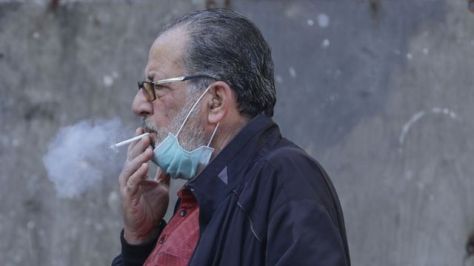
I live in a state in which masks are mandated to prevent the spread of COVID-19.
The other day I went to the grocery store, and I estimated that at least 20 people in the store were not wearing masks. I noticed two distinct groups refusing to wear masks — people under 35 and women of all ages.
Interestingly enough, I’d say every single guy in the store over the age of 40 was wearing a mask. Not sure I saw one older guy without one. I saw a few older women not wearing masks.
Anyway, it’s been interesting to see and read the rhetoric against wearing masks and how much the rhetoric sounds EXACTLY like something I’ve heard before.

Others have pointed out that the debate over wearing masks is a lot like the debates a couple of decades ago over seatbelt laws.
There’s even an article about it, from Business Insider:
Massachusetts radio personality Jerry Williams transformed his talk show into a crusade against seat belts, gathering 45,000 signatures in three months. He managed to get a referendum on the ballot to repeal the state’s new belt law.
“We don’t feel we should be forced to buckle up and have a police officer sent in by the state to make sure we’re buckled up,” Williams told the South Florida Sun-Sentinel in 1986.
“There was a libertarian streak among resistors,” Nader told Business Insider. “They took the stance that ‘you’re not going to tie the American people up in seat belts.'”
A similar ideology seems to be fueling pushback against face covering during the pandemic.
Republican Gov. Mike DeWine of Ohio was forced to rescind his face-mask order, he told ABC News, when he realized Ohioans “were not going to accept the government telling them what to do.”
In California, an anti-lockdown protester held a sign comparing wearing masks to slavery, Newsweek reported.
Nader says he believes most modern-day mask slackers are fueled by obstinance, not a political agenda.
Nader at the American Museum of Tort Law in Winsted, Connecticut, in 2015. Bradley E. Clift for The Washington Post via Getty Images
“It’s just an ornery personality trait by some people,” he said. “They’re not community people.”
There you go. They’re not community people. They don’t see themselves as a part of society, they see themselves as rugged individualists, fighting against the “state” or whatever.
I will fully admit that I was resistant to wearing a seatbelt until probably about the mid-90s. I even walked away from two rollover wrecks without wearing a seatbelt in either one of them. I finally caved after I got a couple of seatbelt tickets, and frankly it was no big deal and it was stupid of me to resist the idea.
The big argument against seatbelt laws is personal liberty. The big argument against it is that they save lives. As far as being part of a community, seatbelt laws are shown to reduce fatalities and major injuries, which is turn reduces insurance rates. So, we all save when everyone is wearing a seatbelt.
For several years from about 2005-2010, I can’t tell you how many arguments I had with idiots and Libertarians (sorry, really kind of the same thing) over “personal liberty” and smoking bans. While some people have pointed out the similarity of the masking debate with seatbelts, I personally am immediately reminded of the same idiotic arguments against restaurant and bar smoking bans 10 to 15 years ago.

I banged my head, and banged my head and banged my head against the brick walls those people threw up over smoking bans I don’t know how many times.
Here’s where the “personal liberty” argument failed with smoking. A person’s personal liberty ends where it affects another person. It’s not only obnoxious and rude to inflict your secondhand smoke on others, it’s also been shown that it affects people’s health, especially people who are forced to work in a smoky environment. Your personal liberty ends as soon as that smoke comes out of your mouth.
Same thing with masking. Masking provides some protection for the mask-wearer, but they provide even more protection to others from the person wearing the mask. Simply put, they really do stop the spread of COVID-19.

Unlike smoking bans, I don’t totally get the resistance to wearing a mask. I really don’t. It just feels like something out of “Idiocracy.” It’s people taking the concept of “personal liberty” the extreme that they abandon all common sense. It reminds me of a Bors cartoon in which a woman makes fun of Donald Trump for putting ketchup on his burnt steak, so some Trump supporter has to burn a steak to the point where he has to cut it with a chainsaw and then put ketchup on it to “own the libs!” Not wearing a mask is somehow “showing the libs?” Showing them what? That you really don’t give a damn about others?
At least with the people fighting smoking bans, I could see some of their logic — that something was being taken away from them that they had always had: The ability to smoke while sitting at the bar. Nothing is being taken away from anyone by asking people to wear a damn mask when you go to the store.
Wear a damn mask. I tell people: “You want the economy to reopen, you want to be able to go to the bar or the restaurant? Then wear a mask, or else they’re going to forced to close everything down again.”

























